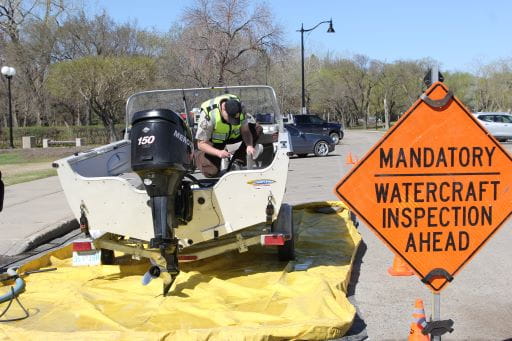Released on July 20, 2021
Saskatchewan residents travelling across provincial and international borders with boats are reminded to keep an eye out for inspection stations along highways and near waterbodies.
The requirement to stop at all watercraft inspection stations is part of a coordinated effort between provinces and states to prevent the introduction and spread of aquatic invasive species (AIS).
AIS not only have the potential to harm aquatic habitat and fisheries, but can also cause damage to important infrastructure related to power and water management, costing millions of dollars each year.
AIS species such as zebra and quagga mussels are virtually impossible to eradicate. Once introduced and established, they can spread rapidly - with one female producing up to a million eggs per year. Let's protect our waters!

The inspection process can be much quicker and easier if the watercraft is properly cleaned, drained and dried. Wherever you travel, remember to:
- Clean: remove plants, animals and mud from trailers, hulls, motors and fishing equipment using high pressure, hot tap water.
- Drain: drain all water (including bilges and livewells) and flush with hot tap water.
- Dry: allow all equipment to dry completely, ideally five days prior to travel, while leaving compartments open to dry.
- Pull the plug: leave plugs out during transport and tilt watercraft when stored to allow the bilge to both drain and dry. As of 2020, it is mandatory to remove all watercraft drain plugs during transportation, you could face a fine for failing to do so.
Saskatchewan continues to be free of AIS. Ensuring that watercraft owners stop at open inspection stations, even if you were previously inspected, will help the province retain this critically important status.
-30-
For public inquires, contact:
Inquiry Centre
Environment
Phone: 1-800-567-4224
Email: centre.inquiry@gov.sk.ca
For media inquiries, contact:
Chris Hodges
Environment
Regina
Phone: 306-787-0143
Email: chris.hodges2@gov.sk.ca
Cell: 306-527-1603

